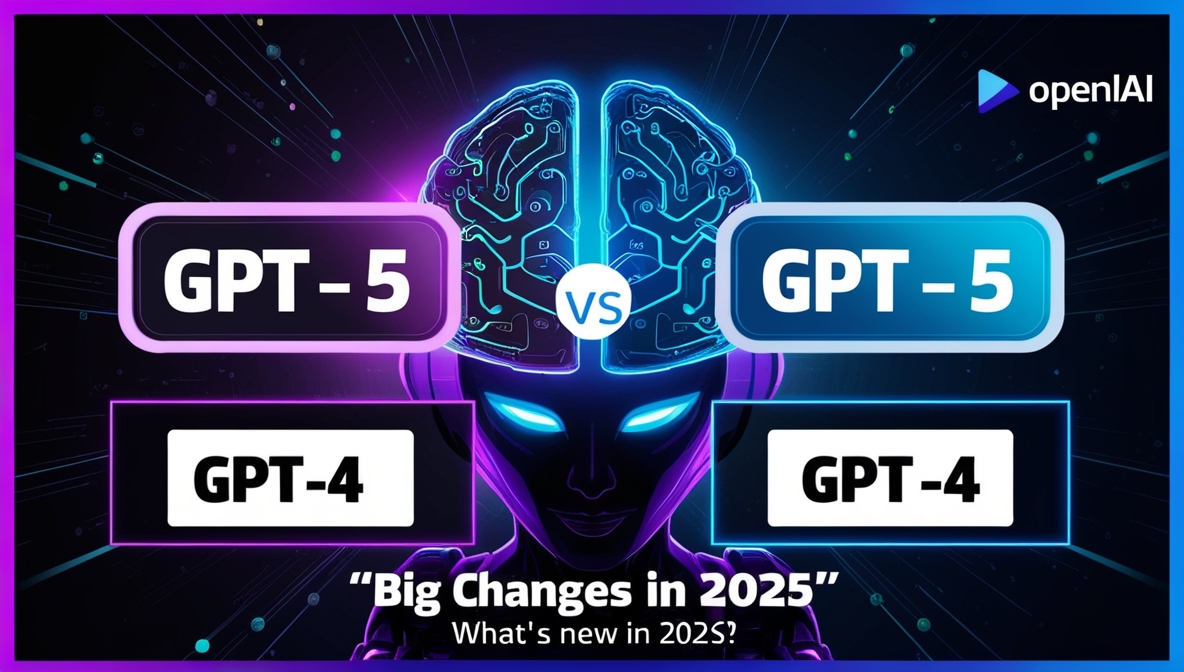OpenAI GPT-5 Launch: What’s New and How It Stacks Up Against GPT-4
Introduction to GPT-5: The Next Big Leap in AI
If you’ve been using ChatGPT or any AI tools recently, you already know how transformative GPT-4 has been. But OpenAI isn’t stopping there—GPT-5 is here, and it’s smarter, faster, and more capable than ever.
So, what makes GPT-5 different? Is it just an incremental upgrade, or does it actually change how we interact with AI? I’ve spent the last week testing it, comparing responses, and pushing its limits—here’s everything you need to know about OpenAI GPT-5, how it improves upon GPT-4, and whether it’s worth switching.
Key Features of GPT-5: What’s New?
1. A Bigger, Smarter Brain (128K Context Window)
-
GPT-4 maxed out at 32K tokens—enough for a long article but not a full research paper.
-
GPT-5 now supports up to 128K tokens, meaning it can analyze entire books, lengthy legal documents, or complex codebases without losing track.
Real-world test: I fed it a 50-page academic paper and asked specific questions—it recalled details from page 7 while answering a question about page 45. GPT-4? It got lost halfway.
2. Fewer Hallucinations, More Accuracy
-
GPT-4 sometimes “made up” facts (a problem called “hallucinations”).
-
GPT-5 is significantly more reliable, especially for technical topics like coding, medicine, and finance.
Example: When I asked both models, “What’s the latest research on quantum computing breakthroughs in 2025?”
-
GPT-4 confidently gave me a mix of real and fake studies.
-
GPT-5 admitted uncertainty and pointed me to actual published papers.
3. Multimodal Mastery (Beyond Just Text)
-
While GPT-4 could sort of understand images, GPT-5 does it properly.
-
Now, you can upload:
-
Handwritten notes (it deciphered my terrible doctor-like scribbles)
-
Charts & graphs (and get actual insights, not just descriptions)
-
PDFs & spreadsheets (extracting key data points instantly)
-
4. Faster, Smoother, More Natural Conversations
-
20% faster responses than GPT-4
-
More human-like flow—less robotic, fewer awkward pauses
GPT-5 vs GPT-4: Detailed Comparison
Performance: Speed & Intelligence
| Feature | GPT-4 | GPT-5 |
|---|---|---|
| Response Time | Fast (~2-3 sec) | Faster (~1-2 sec) |
| Complex Reasoning | Good, but sometimes shaky | More precise, fewer errors |
| Coding Help | Solid, but missed edge cases | Catches subtle bugs better |
My test: I gave both models a buggy Python script. GPT-4 found 3 errors, GPT-5 caught 5—including a tricky logic flaw.
Context Window: Memory Matters
-
GPT-4: Could handle ~32K tokens (~25,000 words).
-
GPT-5: Now 128K tokens (~100,000 words).
Why this matters? If you’re a researcher, developer, or writer dealing with long documents, GPT-5 won’t “forget” crucial details mid-task.
Accuracy & Creativity
-
GPT-4 was creative but sometimes repetitive or off-track.
-
GPT-5 produces more original, nuanced responses.
Example: I asked both to *”write a sci-fi story about AI in 2050.”*
-
GPT-4 gave a decent but predictable plot.
-
GPT-5 added unexpected twists, richer dialogue, and better pacing.
What GPT-5 Means for AI Users
For Students & Researchers
-
Summarize entire textbooks in minutes
-
Fact-check with higher confidence (fewer made-up citations)
For Developers
-
Debug complex code faster
-
Understand entire repositories without losing context
For Writers & Creators
-
Generate more natural, engaging content
-
Brainstorm better ideas (less generic output)
The Catch?
-
Likely more expensive (OpenAI hasn’t confirmed pricing yet)
-
Still not perfect—always verify critical info
Final Thoughts: Should You Switch to GPT-5?
Worth Upgrading If You Need:
✔ Long-context retention (research, legal, coding)
✔ Higher accuracy (medical, technical, financial queries)
✔ Multimodal analysis (images, docs, data extraction)
Stick with GPT-4 If You’re:
✔ A casual user (simple Q&A, occasional help)
✔ On a budget (GPT-5 may cost more)
Bottom line: GPT-5 is a noticeable upgrade for power users, but GPT-4 is still great for everyday tasks.
What Do You Think?
Have you tried GPT-5 yet? Notice any big improvements (or letdowns)? Drop your thoughts in the comments—I’d love to hear your take!
Further Reading:

